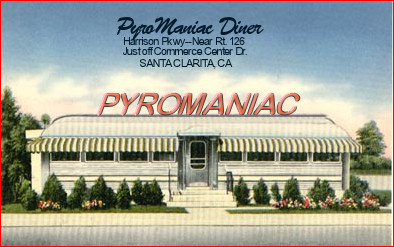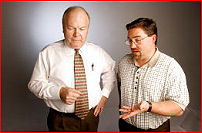 Leftover comments about this week's discussion
Leftover comments about this week's discussion
Wrapping Up on the issue of Evangelical-Mormon Rapprochement
(First posted Friday, September 09, 2005)


've had a couple of private conversations and received a few off-line e-mails this week [September 5-9, 1995] regarding the Millet-MacArthur meetings. Also, one or two issues came up in the comments that I wanted to respond to but didn't have time.
So I thought a good way to end the week was by posting a list of my own comments and observations. Here are a few lingering thoughts about evangelical-Mormon
détente:
- I agree with whoever said it's not entirely fair to draw harsh conclusions about Talbot School of Theology solely from a paper two students wrote eight years ago.
- Still, I think there's ample evidence that recent policies at Biola-Talbot have deliberately and aggressively sought to move the school's historic boundaries outward. In the late '90s, after a task force issued a report advising the administration that Eastern Orthodox doctrine is incompatible with the school's evangelical stance, three Eastern Orthodox faculty members (including an Orthodox priest who served as dean of students) were nevertheless permitted to remain in their teaching positions.
- And here's a giddy news report from a Mormon source celebrating the fact that eighteen Biola students visited Brigham Young University last January for dialogue and relationship-building, so that the evangelical students could "pursue truth together" with Mormon kids.
- One of the main organizers of that get-together was Pastor Greg Johnson, who has practically made a career out of holding public "dialogues" with Mormonism's best-known missionary to naive evangelicals, Dr. Robert Millet. Pastor Johnson had the unmitigated gall to tell a Mormon reporter, "We are trying to show the upcoming generation that we don't have to be confrontational on truth. There is a lot of room for us to build on our compromise of scriptures." Those are his exact words. I kid you not.
- To be clear: I don't think the atmosphere of creeping ecumenism is unique to Biola. You'll find evidence of the same subtle latitudinarianism at many once-solid evangelical schools (and even a few formerly fundamentalist ones). But if you were to ask me whether the ideas set forth by Carl Mosser and Paul Owen in their infamous 1997 paper are novel notions they brought with them to Talbot or the kind of ideas we might expect from someone who has absorbed the post-evangelical atmosphere that dominates many so many institutions of higher learning in the Moody/Wheaton/Biola genre—my judgment would be the latter.

Dr. Millet and Pastor Johnson |
By the way, Greg Johnson is the Utah pastor who (before it became clear that his strategy was one of compromise) first contacted John MacArthur to arrange a meeting with Millet in 1997. Johnson is a former Mormon, and he has founded a ministry he calls "Standing Together." He seems obsessed with "seeking common ground" between Mormons and evangelicals, and he and Millet appear regularly together on a television program aired in Salt Lake City, called "Bob and Greg in Conversation."
Here's an intriguing point of trivia: Johnson and Millet made a joint pilgrimage to visit the esteemed Bishop of Durham, N. T. Wright, back in May [2005].
- Both Carl Mosser and Paul Owen e-mailed me today [9 September 2005] after hearing about yesterday's blogpost. Without really addressing anything concrete in my posts, Owen accused me of "lying" and (as is his custom) dismissed me and pretty much all my friends as "uneducated." As usual, however, despite all his bluster about academic integrity and the importance of dispassionate scholarship, he neglected to reply with anything resembling an argument or documentation.
Mosser was friendlier, but he said according to the way he remembers it, MacArthur ultimately confirmed Mosser's description of the Millet meeting and I later had to retract my objection to Mosser's account of the meeting. Apparently Mosser's memory is as mangled as his original report claiming "that Millet and MacArthur came very close together in their views."
- For the record, here is John MacArthur's own description of the Millet meeting, taken from a letter MacArthur wrote to clarify the facts for someone who had been told that MacArthur was part of the campaign to establish "common ground" with Mormonism:
When I met with Robert Millet I expressed my conviction as clearly as possible that the God of the Bible is a completely different God from the god of Mormonism, that the Christ of Scripture is a wholly different Christ from the christ of Mormonism, and the true gospel is a radically different gospel from the gospel of Mormonism.
I have maintained a cordial relationship with Dr. Millet for the sake of the truth, and am happy to provide him with as much of my material as he wishes to read. But my concern is for the truth; I'm not interested in artificial harmony between two contradictory faiths. For that reason I have consistently made clear in all my dialogue with Dr. Millet that there is no spiritual common ground between biblical Christianity and Mormonism.
I would never deliberately equivocate on the truth or do anything that might lend credence to Mormonism. I'm convinced (as are all who understand Scripture accurately) that Mormonism is a false religion, generated by Satan. It is a damnable heresy, and in the words of Paul, "a different gospel," under God's anathema.
 |
|
Clear enough?

 Leftover comments about this week's discussion
Leftover comments about this week's discussion
 've had a couple of private conversations and received a few off-line e-mails this week [September 5-9, 1995] regarding the Millet-MacArthur meetings. Also, one or two issues came up in the comments that I wanted to respond to but didn't have time.
've had a couple of private conversations and received a few off-line e-mails this week [September 5-9, 1995] regarding the Millet-MacArthur meetings. Also, one or two issues came up in the comments that I wanted to respond to but didn't have time.













19 comments:
Of the elements that bother me most concerning efforts as you describe in your post is that it seems like I am almost always the one playing defense in ventures such as these. Of course I am nowhere on the scale like Dr. Macarthur but the principle still applies. As a minority voice (where I am personally), the major obstacle for those around me is knowledge of theological content and doctrinal understanding. And, it seems like every time I call for accountability in these areas, my position on a given subject is often misconstrued. I end up having to re-clarify my position. As I do this scripturally, historically, and theologically, many times my critic isn’t even called on to justify his/her position and are very rarely able to articulate their particular objection to my stance in a cogent manner. It gets to be very frustrating. Just as in Dr. MacArthur’s case, all it takes is an insinuation and he has to once again defend his position. Does it ever stop? Is it ever “clear enough”?
Isn't it odd that Dr. MacArthur has 40 years body of evidence (sermons, books, interviews) in which he proclaims clearly the truth of God's Word.
Then, he has one lunch with a Mormon in which he behaves cordially and suddenly he's a waffler.
To me, it shows the desperation that must exist in the Mormon camp; that their doctrine is unable to stand on its own merit, but instead seeks to sully the good name of a good man to gain credibility. This is nothing less than diabolical.
This is a cautionary tale. Christians should never meet with Mormons on equal theological grounds. They'll only use it for PR.
Christians have one reason, and one reason only, to interact with Mormons: to get them the truth of the gospel as a means of delivering them from deception. That's it. Mormon "scholars" can talk amongst themselves. They are not invited into our camp, unless they come seeking deliverance.
Sandman said, "To me, it shows the desperation that must exist in the Mormon camp; that their doctrine is unable to stand on its own merit, but instead seeks to sully the good name of a good man to gain credibility. This is nothing less than diabolical."
Sandman,
They did it to Jesus first. It's a good sign concerning whose side he's on that they then turn around and do it to John MacArthur.
Brass: Well-said.
"We are trying to show the upcoming generation that we don't have to be confrontational on truth. There is a lot of room for us to build on our compromise of scriptures."
The spirit of the age! Post-evangelical, postmodern, and ecumenical compromise.
I graduated from Talbot with my Master's in the early eighties, and taught there a bit. Many of us students and faculty alike were concerned and alarmed at what we saw (and I phrased) as Biola's desperate itch to be approved by Caesar, and admired by the world. To do that, of course unpopular marks of distinction had to be cast aside - distinctively Biblical views of the role of women, of creation and evolution, and the like.
This is alarming but not surprising. I'd be pleasantly surprised if the intervening years have ameliorated affairs. Many of us feared that one day we'd be having to explain our degrees, as Fuller grads from the 50s and 60s have had to explain theirs.
I've been sort of busy recently and haven't read all the comments thoroughly, so apologies if I missed it. Has anyone made the connection yet between this series and Dan's post from Thursday about the Manhattan Declaration?
I don't know -- "damnable heresy" is kinda ambiguous. Maybe the Mormon apologists are right after all . . .
Well said Phil.
Suggested name change from Biola to Viola, since they're a beautiful instrument seeking to be played by as many artists as possible. Or maybe Biola to Campolo, for other obvious reasons.
Note: you may want to update that quote.. there was an addendum to the news article saying "Pastor Greg Johnson, director of Standing Together Ministries in Utah, has requested a clarification of his quote that appeared in an article titled 'Evangelists visit BYU, Temple Square,' published Jan. 21, 2005: 'We are trying to show the upcoming generation that truth does not always have to be confrontational. There is a lot of room for us to build on our common values and share on our perspectives of the scriptures.'"
By all means, change "compromise" to "perspective". What an insightful clarification.
Thanks Phil,
Great set of posts. The other day, when visiting with some mormon elders, I tried to engage in debate - either they couldn't or wouldn't answer my questions. But they were sure of one thing that they repeated over and over - we're Christians too!
I'm absolutely stunned Paul Owen hasn't resurfaced with this series' republishing.
He was always good for a laugh.
David, I think scripture uses a far more crude image to describe what you're talking about. Something concerning a harlot spreading her legs beneath every green tree on any high place. Not a very good picture concerning the subject being likened to the harlot.
Forgive me if this comment has already been made or elsewhere, but I am watching the Fox News career of Glenn Beck with great interest. If anyone here saw his Christmas special complete with a Gospel choir, I have no doubt that this will all go hand in hand with Mormonism's intense efforts to mainstream itself with typical evangelicals.
How this applies here specifically is that those of us who continue to hold to biblical truth and brand Mormonism as the false religion that it is will continue to grow increasingly unpopular in this warm, fuzzy ecumenical world.
I spent the last three years doing pastoral ministry in Utah, and it is amazing to see how God is drawing mormons out of the LDS church and to the clear Gospel of Christ. I had the privilege to baptize and disciple many individuals. Many of them shared that the willingness of Christians to simply reach out in love was all it took to pull them out of the deadness of the LDS church.
I got to know Greg Johnson during that time and I never found him to be be unclear in his communication about the differences between mormons and Christians...in fact is some ways he was stauncher than I was in his stand on historical Christian doctrine (and I'm plenty staunch).
But he does have a passion to reach mormons. Recently his organization, along with other Utah pastors, brought out Nick Vujacic for some evangelistic events, one that actually took place at the Mormon Temple. Vujacic was completely clear in his gospel presentation. The impact of the event went beyond the walls of the temple and out into the community via multiple news stories.
I resonate with the words of Ravi Zacharias, who wrote this after his historic speaking engagement at the LDS temple is Salt Lake City:
"To critics who objected to my being there, I say that all my life as an apologist I have spoken across wide chasms of thought and to virtually every major religious group — sometimes at the risk of violence. Differences ought not to keep us from carrying the truth to everyone. Must we not graciously build one step at a time in communicating our faith with clarity and conviction? Is it really necessary at the early stages of such openness to “dump the whole truckload of goods,” rather than first gaining a hearing and respect? I have no doubts about the differences between the LDS faith and the historic Christian faith — differences deep and foundational in terms of authority. But the proclamation of the living Christ can break down hearts all over the world, that we might see ourselves as He sees us and call upon Him and no one else for our salvation. Must not our methods be in keeping with our message? There are numerous instances in Scripture where Jesus went to those of a contrary view and with grace, sowed one small seed at a time. The courtesy and graciousness extended to me by every Mormon leader and professor with whom I came into contact cannot be gainsaid. My earnest prayer is that the Lord was honored in what happened and that the opportunities that come from this event will multiply. There is no other name given under heaven whereby we may be saved. How we communicate that name is equally important as the message itself if we are to be persuaders of men and women under the anointing of the Holy Spirit."
Sled: I doubt anyone argues with the statement that we ought to engage with those outside the faith. The trouble was with trying to explain away the differences between our faith and theirs, rather than trying to convince them of their error.
Post a Comment